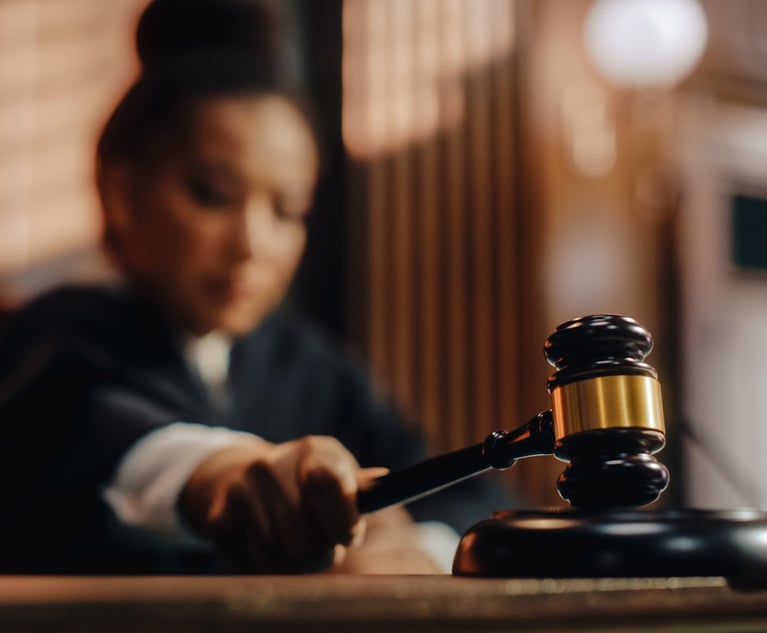Immunity Uncertain for School Board That Banned 'Threatening' Man From Meetings
A federal appeals court held that a man who was kicked out of a school board meeting for making threatening remarks was protected by the First Amendment, but the question of whether he could sue school officials still needs to be hashed out.
December 07, 2017 at 04:12 PM
3 minute read

A federal appeals court held that a man who was kicked out of a school board meeting for making threatening remarks was protected by the First Amendment, but the question of whether he could sue school officials still needs to be hashed out.
The U.S. Court of Appeals for the Third Circuit on Thursday affirmed in part and vacated in part the dismissal of John Barna's case against the Panther Valley School District board of directors. The circuit court held that the board members were entitled to qualified immunity in their individual capacity, but remanded the case for further proceedings to answer the question of whether they were immune in their official capacities.
Barna was thrown out of an April 2010 school board meeting discussing a contract he thought was a waste of money, according to Third Circuit Judge Michael A. Chagares' opinion. Barna suggested that next time, he'd bring his friends to the meeting and told the directors, “You wouldn't like that. Some of my friends have guns.”
Taking that as a threat, board member Jeffrey Markovich expelled Barna from the meeting. While leaving the meeting, Barna said, “'Don't laugh, I may have to come after all of yous,'” according to Chagares.
After suing the school board for categorically banning him from attending future school board meetings, a Middle District judge ruled that the officials were immune from suit, even though the judge held that the ban violated Barna's constitutional rights.
On appeal, Barna said the court was wrong to grant the school board members immunity in any capacity, arguing primarily that he had a right to attend school board meetings. However, Chagares said in upholding the grant of immunity on an individual basis that the law was hazy as to that purported right.
“We therefore conclude that, given the state of the law at the time of the board's ban, there was, at best, disagreement in the courts of appeals as to the existence of a clearly established right to participate in school board meetings despite engaging in a pattern of threatening and disruptive behavior,” Chagares said.
As for immunity in the board's official capacity, the question was somewhat trickier.
“The Supreme Court in Owen v. City of Independence held that municipalities do not enjoy qualified immunity from suit for damages,” Chagares said, “The district court overlooked the Supreme Court's precedent in Owen and improperly awarded qualified immunity to the board. In his opening brief to this court, Barna appealed this ruling generally, but made no arguments specific to the board entity, did not distinguish among the defendants, and did not cite Owen as controlling authority. The board, by contrast, concedes that qualified immunity does not shield municipal entities under Owen but maintains that it is entitled to immunity because Barna failed to preserve the issue by not addressing it before the district court or in his opening brief to our court.”
However, Chagares said there were exceptional circumstances that saved Barna's generic argument, namely the fact that there was no argument over Owen's applicability at the lower level.
“The public interest would be better served by addressing the Owen issue than by ignoring it,” Chagares said.
Barna is represented by Tamaqua-based lawyer Gary D. Marchalk; Thomas A. Specht of Marshall Dennehey Warner Coleman & Goggin in Scranton represented the board. Neither responded to requests for comment.
This content has been archived. It is available through our partners, LexisNexis® and Bloomberg Law.
To view this content, please continue to their sites.
Not a Lexis Subscriber?
Subscribe Now
Not a Bloomberg Law Subscriber?
Subscribe Now
NOT FOR REPRINT
© 2025 ALM Global, LLC, All Rights Reserved. Request academic re-use from www.copyright.com. All other uses, submit a request to [email protected]. For more information visit Asset & Logo Licensing.
You Might Like
View All
Phila. Court System Pushed to Adapt as Justices Greenlight Changes to Pa.'s Civil Jury Selection Rules
5 minute read
Pa. Appeals Court: Trial Judge Dismissed Med Mal Claims Without Giving Plaintiffs Proper Time to Fight Back
4 minute read
Phila. Judge Upholds $68.5M Verdict Over Construction Worker's Death
3 minute readTrending Stories
Who Got The Work
Michael G. Bongiorno, Andrew Scott Dulberg and Elizabeth E. Driscoll from Wilmer Cutler Pickering Hale and Dorr have stepped in to represent Symbotic Inc., an A.I.-enabled technology platform that focuses on increasing supply chain efficiency, and other defendants in a pending shareholder derivative lawsuit. The case, filed Oct. 2 in Massachusetts District Court by the Brown Law Firm on behalf of Stephen Austen, accuses certain officers and directors of misleading investors in regard to Symbotic's potential for margin growth by failing to disclose that the company was not equipped to timely deploy its systems or manage expenses through project delays. The case, assigned to U.S. District Judge Nathaniel M. Gorton, is 1:24-cv-12522, Austen v. Cohen et al.
Who Got The Work
Edmund Polubinski and Marie Killmond of Davis Polk & Wardwell have entered appearances for data platform software development company MongoDB and other defendants in a pending shareholder derivative lawsuit. The action, filed Oct. 7 in New York Southern District Court by the Brown Law Firm, accuses the company's directors and/or officers of falsely expressing confidence in the company’s restructuring of its sales incentive plan and downplaying the severity of decreases in its upfront commitments. The case is 1:24-cv-07594, Roy v. Ittycheria et al.
Who Got The Work
Amy O. Bruchs and Kurt F. Ellison of Michael Best & Friedrich have entered appearances for Epic Systems Corp. in a pending employment discrimination lawsuit. The suit was filed Sept. 7 in Wisconsin Western District Court by Levine Eisberner LLC and Siri & Glimstad on behalf of a project manager who claims that he was wrongfully terminated after applying for a religious exemption to the defendant's COVID-19 vaccine mandate. The case, assigned to U.S. Magistrate Judge Anita Marie Boor, is 3:24-cv-00630, Secker, Nathan v. Epic Systems Corporation.
Who Got The Work
David X. Sullivan, Thomas J. Finn and Gregory A. Hall from McCarter & English have entered appearances for Sunrun Installation Services in a pending civil rights lawsuit. The complaint was filed Sept. 4 in Connecticut District Court by attorney Robert M. Berke on behalf of former employee George Edward Steins, who was arrested and charged with employing an unregistered home improvement salesperson. The complaint alleges that had Sunrun informed the Connecticut Department of Consumer Protection that the plaintiff's employment had ended in 2017 and that he no longer held Sunrun's home improvement contractor license, he would not have been hit with charges, which were dismissed in May 2024. The case, assigned to U.S. District Judge Jeffrey A. Meyer, is 3:24-cv-01423, Steins v. Sunrun, Inc. et al.
Who Got The Work
Greenberg Traurig shareholder Joshua L. Raskin has entered an appearance for boohoo.com UK Ltd. in a pending patent infringement lawsuit. The suit, filed Sept. 3 in Texas Eastern District Court by Rozier Hardt McDonough on behalf of Alto Dynamics, asserts five patents related to an online shopping platform. The case, assigned to U.S. District Judge Rodney Gilstrap, is 2:24-cv-00719, Alto Dynamics, LLC v. boohoo.com UK Limited.
Featured Firms
Law Offices of Gary Martin Hays & Associates, P.C.
(470) 294-1674
Law Offices of Mark E. Salomone
(857) 444-6468
Smith & Hassler
(713) 739-1250






